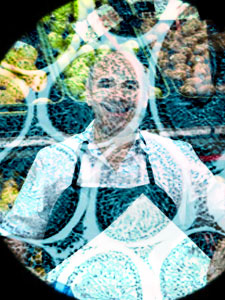Page 1 Page 2

Twice a week, I have almost the same conversation with the greengrocer.
“Beautiful lady!” he says. “What can I do for you today?”
“Darling greengrocer!” I reply. “I need a bunch of five or six small bananas; a kilogram of green apples – not too green, though; a head of broccoli and a kilogram of tomatoes.”
“I’ve got some pomegranates today,” he adds. He might just as easily mention persimmons, or fresh figs, or champagne grapes, whatever is in season. “They won’t last long.”
“And two pomegranates,” I tell him, because it may be my only chance to have a pomegranate in season.
I hand him my money; he hands me my bag of fruit and vegetables.
“You’re my favorite customer,” he tells me.
“And you’re my favorite greengrocer,” I tell him.
Then, I step out of the way so he can greet the next customer. She’s usually about eighty years-old. Sometimes she has a little beard but is well-dressed.
“Beautiful lady!” he says. “What can I do for you today?”
You have to remember we have this conversation in German. It’s much more charming when I translate it into English than it is in real life, but I have to tell you I like this greengrocer. I don’t like him because of the flattery. It isn’t really flattery when he says exactly the same thing to everyone. I like him because he has made the transaction of buying fruit and vegetables his own. He is a shopkeeper on his own terms.
Once, I stood off to the side and listened to him for a bit until there was a lull in business.
“Always bananas?” he asked me when we could talk. “Always apples?”
“My daughter only eats bananas,” I explained. “My son only eats apples.”
“Why?”
“Kids,” I shrugged.
“Kids,” he repeated. “You only have two?”
I nodded.
“I thought so,” he said. “I can tell from the hips. You might have one more.”
“From my hips!” I was shocked. I felt a bit self-conscious when he said that.
“In my country I used to be a women’s doctor,” the greengrocer explained.
“A gynecologist?” I asked.
“Oh, you know your Latin?” he asked me.
“No, no, it’s what we always say in English,” I explained. “We don’t have familiar terms for medical words where I come from.”
“Maybe I should have moved to your country,” the greengrocer-gynecologist told me. “Do you know what they call a placenta here? A mother cake. How do people learn all these words when they aren’t born here?”
“The midwife made me feel like I was going to give birth to an alien baker every time she talked about ‘the mother cake,’” I confessed.
We shrugged at each other. The local dialect obviously still confused both of us.
“I used to be a writer but only in English,” I told him.
“I’ll tell you a story. You can write it in English and pretend you made it up,” he told me.
I nodded. I was used to these things.
“In my country,” the greengrocer said, “I delivered more than one thousand babies. One of my mothers had fourteen children. Can you imagine that? She had good hips.”
I thought he was going to tell me a story of former glory. Immigrants, like both of us were, often indulged each other by listening to how important, how appreciated, we had been in our own countries. I have to say I always enjoyed the ritual, even if all we accomplished by exchanging stories was to instill a sense of pity for the other. The greengrocer, though, wasn’t going to tell that kind of story.
“It wasn’t easy being a women’s doctor in my country,” he told me. “We were always at war, and pregnant women carried more fear than hope. There were already so many orphans.”
“And then, it got even worse,” he said. “The new government decided men should not treat women. It was too tempting, they said. It led to nothing but sin.”
“What did you do?” I asked him.
“I became a barber like my father,” he said. “I already knew the trade from my childhood, but it didn’t last.”
“What happened?” I wanted to know.
“The neighbor boy came running for me. His mother was having a bad time with her fifth birth. She was screaming and screaming for a doctor. There was no hospital; there was nowhere for her to go for help. So I went with the boy to his mother. She was fully clothed; she knew enough to stand and grip something. She knew gravity would help her. I didn’t see her flesh, and I did not touch her or break the law then. I could tell the baby was breech from her shape.”
Page 1 Page 2
Pages: 1 2

